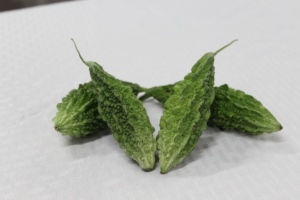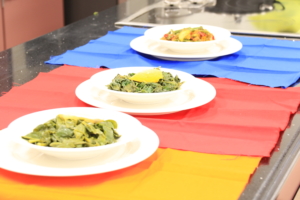September 9 – When it comes to summer, Prairie View A&M University students have a big decision on how to spend their time, whether it’s to take a break from the long school year or to continue to push forward in their education. For Senior Nutrition major Brittany Carter, her decision to continue in her degree plan for the summer was easy.
Carter shadowed Family and Community Health Program Specialist, Ms. Joyce Osborne to fulfill the practical experience requirement for her degree plan in the course titled HUNF 4303 – Human Nutrition and Food Practicum. As part of the course students are required to complete a minimum of 200 clock hours of supervised work activities. The goal of the course is to provide opportunities for Human Nutrition and Food majors to gain applied field experiences in varied domains of the profession and develop personal portfolios. Carter chose the CEP to fulfill her practical experience because of her interest in community nutrition. She plans to become a Registered, Licensed Dietitian and work in the area of wellness as it relates to nutrition and to work in the community to help people make healthier food choices and lead better lives.
This summer, Carter had an opportunity to observe and assist Ms. Osborne. As part of Ms. Osborne’s work, being a Program Specialist as well as a Registered Dietitian (RD), Licensed Dietitian, and Certified Health Education Specialist (CHES), she regularly assists CEP county agents to implement nutrition-related health and wellness programs and general nutrition programs to include healthful food demonstrations and recipe development. Carter assisted Ms. Osborne in preparing recipes and conducting sensory evaluations on several healthful recipes that were developed using produce grown on PVAMU’s Governor Bill and Vara Daniel Farm. Carter also practiced food quality and safety as it relates to purchasing, preparing, and storing food using procedures that prevent the spread of bacteria and reduce the risk of  foodborne illnesses.
foodborne illnesses.
Carter shares, “My internship with the CEP was something that I would have never imagined. The great exposure to the life of a Program Specialist was very interesting and it was good to see some of things that they put together for the community. Ms. Osborne gave me the opportunity to give my own views. Prior to the internship, recipe development or even cooking was something that I was not even interested in, but the exposure and making my own recipes changed all of that.” Carter chose to focus on creating a recipe for bitter melon (karela) and through her experimenting, she developed a delicious dip and was pleasantly pleased with what she came up with. After finalizing the recipe, she gave a presentation on bitter melon and its nutrient content, and conducted a sensory evaluation of her dip recipe to the CAHS dean, faculty,  and staff.
and staff.
At the completion of her practical experience, Ms. Carter stated, “The knowledge I gained in my previous courses really helped me when aiding the staff with the development and progression of their programs.” Ms. Osborne says, “Ms. Carter is a very mature, motivated, and knowledgeable young lady and I expect her to actualize her goal of becoming a community dietitian. Also, she became a true part of the CEP Family and everybody was very impressed by her genuine desire to do well.”
The need for more experts in the field of food, nutrition and wellness is something that Osborne hopes is addressed by having these types of programs available to students as approximately 75% of the United States population has an eating pattern that is low in vegetables, fruits, dairy and oils. She says this statistic has led to poor habits and preventable diseases in the limited resource community. “According to studies from the USDA and NIFA, about half of all American adults have one or more preventable, diet-related chronic diseases including cardiovascular disease, type 2 diabetes, overweight and obesity. Disproportionally, the limited resource population is affected by food insecurity, unsafe food supply, and nutrition related health issues at much higher rates than the average American due to limited access to healthful foods.
This work was supported by the USDA National Institute of Food and Agriculture, 1890 Extension Formula Program projects under Section 1444.
Joyce Osborne Program Specialist
Family and Community Health
joosborne@pvamu.edu
936-261-5118


